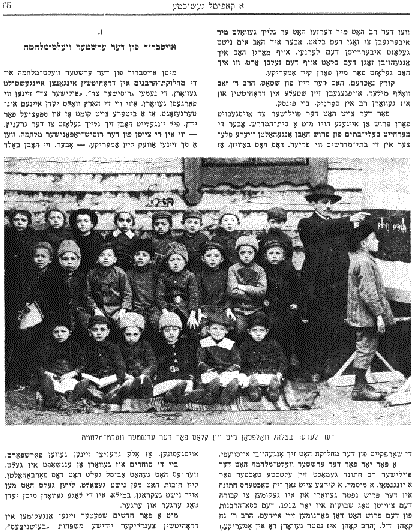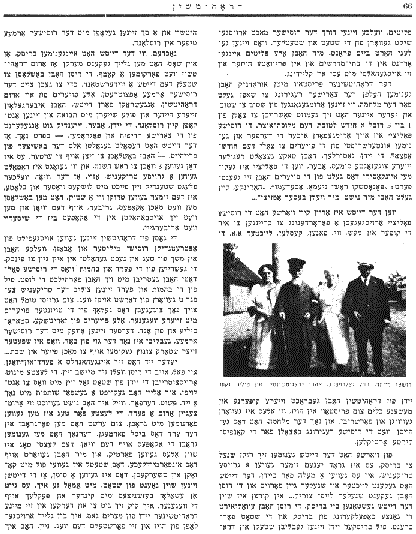Previous Page
|
Next Page
 [
Page 65
]
[
Page 65
]
When the rabbi noticed me, he immediately asked me to read the page out loud.
However, I wouldn't let him cut short his class. The next day I started reading
the page at the same spot where I was before my trip to America.
Shortly afterwards, Rabbi Ze'ev
Wolf Miller, the rabbinical judge in town, left Drohitchin and became a rabbi
in Pinsk. The "Polish group" built the non-chassid a house and a
House of Study. Most of the householders, however, remained at the synagogues
where they were members before. This indicated that the dispute was starting to
dissipate.
[Photo:] The teacher, Betzalel Wolfson, with his class before World War I.
A couple of years before World
War I, the "Polish" rabbi married off his eldest daughter to a young
ordained rabbi. Shortly after his daughter's wedding, in 1912, the non-chassid
died, and was buried on the second day of Shavuot. The non-chassid's position
was filled by his son-in-law, Rabbi Noach Kahn (Rabbi Kahn died in the United
States).
G.
Outbreak of World War I
When World War I broke out, the
rabbinical dispute came to an end, and the nicknames "Russian group"
and "Polish group" were totally forgotten. Everyone had the sense
that bad times were coming, especially for the Jews. Many young men immediately
set off for the border areas, just as people did during the Russo-Japanese War,
in order to get to the United States. This time, however, they quickly found
out that the borders were locked tight.
Businessmen faced tight money,
and anyone who had some money hid it; no one paid off their debts, and no loans
were available. Thus, the situation progressively deteriorated.
A couple of months later,
dozens of Jewish refugee families, who were expelled from towns and cities
along the war front, arrived in Drohitchin.
 [
Page 66
]
[
Page 66
]
We housed the refugees in the Houses of Study and in private homes, and
provided them with food and clothing.
The local mayor and police
chief started helping the Czarist regime to collect as much money as possible
for the war effort. They went from house to house, requiring each person to
contribute 1 to 3 rubles to the national treasury. The Russian police also went
around to local villages and signed up the peasants to pay a monthly
contribution. Of course, the Jews paid their promised contributions on time.
However, when the police went to collect money from the peasants, the peasants
responded, "We don't have any money, so we might as well go to jail."
[Photo:] Jan Meier, Rachel
Goldfarb, Aharon Drogitchinsky and Tilla Zucker
When the Germans got to Warsaw,
the Russian police issued an order to turn over anything made of copper and
brass, including brass vessels, at the mayor's house, where everything was
listed and registered. People were promised that after the war, the Russian
government would pay for the confiscated possessions.
The Germans moved quickly from
Warsaw to Brisk. There was a drought that particular summer, which benefited
both sides. With dry weather, the Germans were able to advance faster, and the
Russians were able to retreat more quickly. The Germans arrived in Brisk very
quickly, and the Russians evacuated the entire population of Brisk and burned
down the city. Many Jews were stranded in Drohitchin, and many moved further
into Russia with the Russian troops.
Afterwards, as soon as the
Germans arrived in Brisk without a shot, they realized that there would be a
battle around Drohitchin. The Russians decided to initiate a resistance to give
their army time to retreat. All the peasants from around Drohitchin were
terrified of the Germans; they abandoned their homes and escaped to Russia with
wagons full of grain. The Jews, however, had long experience with Czarist
pogroms, and since the Germans were then considered to be the supporters of
freedom, the Jews decided to stay put. This was 3 weeks before Rosh Hashanah,
and because of the drought, the Vion, which had been filled with marshland and
water, now turned as dry as bone. People decided to build trenches on the Vion
so they could hide out of the line of fire until the end of the fighting.
The streets of Drohitchin were
filled with retreating Russian soldiers and trucks as day and night they made
their way to Pinsk. The deafening noise of the horses and other animals that
the Russians soldiers were leading away with them filled the air. Many of the
animals died from thirst along the way because of the drought. To make matters
worse, thousands of fleeing peasants and their wagons added to the confusion.
All the peasants of Zaritshka, Stara-Silia and other villages traveled with the
Russian army. Only one gentile, the bathhouse owner remained, and he ended up
being vital for lighting flames on the Sabbath.
Every Jew bought a horse and
wagon so that if, at the last minute, the Russians decided to expel the Jews
from town, the Jews would have means to escape. Together with another Jew I
bought a team of horses. I didn't obviously know how to climb up on a horse.
People spent the last couple of days digging. First of all, they buried their
few remaining possessions, and then started digging the trenches on the Vion.
Everything was ready on the last day, and we waited for the inevitable. The
town became filled with Cossacks and Circassians; this was considered a sign
that the Germans were close by. Occasionally I saw a line of refugees and their
children and bundles on wagons. I looked and them and realized they were
Drohitchin Jews from Egypt Street. I ran out of the house and showed them the
way. I told them that
Previous Page
|
Next Page
This material is made available by JewishGen, Inc.
and the Yizkor Book Project for the purpose of
fulfilling our
mission of disseminating information about the Holocaust and
destroyed Jewish communities.
This material may not be copied,
sold or bartered without JewishGen, Inc.'s permission. Rights may be
reserved by the copyright holder.
JewishGen, Inc. makes no representations regarding the accuracy of
the translation. The reader may wish to refer to the original material
for verification.
JewishGen is not responsible for inaccuracies or omissions in the original work and cannot rewrite or edit the text to correct inaccuracies and/or omissions.
Our mission is to produce a translation of the original work and we cannot verify the accuracy of statements or alter facts cited.
 Drogichin, Belarus
Drogichin, Belarus
 Yizkor Book Project
Yizkor Book Project
 JewishGen Home Page
JewishGen Home Page
Yizkor Book Director, Lance Ackerfeld
This web page created by Lance Ackerfeld
Copyright © 1999-2025 by JewishGen, Inc.
Updated 10 Dec 2001 by LA
 [
Page 65
]
[
Page 65
]



